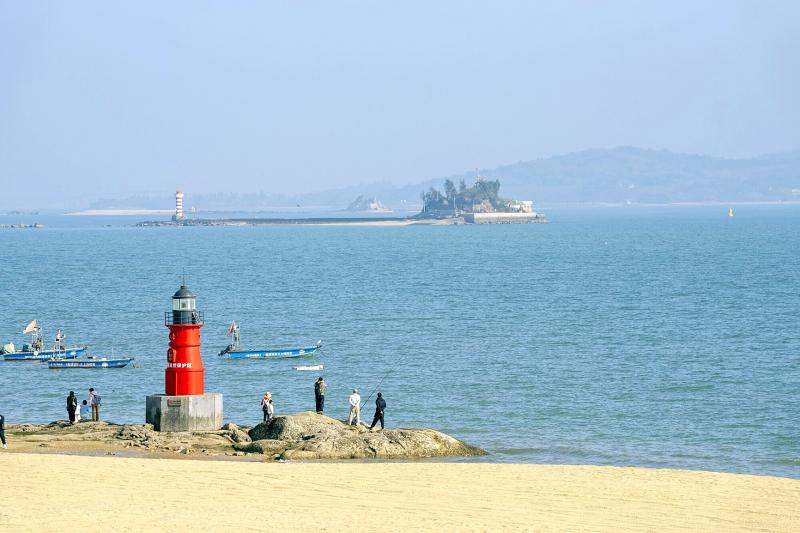China’s claim that the waters between Taiwan’s Kinmen County and China’s Xiamen are not a restricted area is an example of Beijing employing “gray zone” tactics to ratchet up pressure against Taipei, an expert said yesterday.
National Defense and Security Research research fellow Shen Ming-shih (沈明室) said the once-held tacit understanding between China and Taiwan that the waters around Kinmen, Lienchiang County (the Matsu islands) and other outlying islands are “restricted” or “prohibited” appears to be broken.
“Restricted” or “prohibited” waters refer to maritime areas controlled by Taiwan which, under Taiwanese law, it has the right to defend.

Photo: Bloomberg
The topic has become a point of contention after a speedboat from China’s Fujian Province on Wednesday capsized off the coast of Kinmen while being pursued by Taiwanese authorities, resulting in two fatalities.
China’s Taiwan Affairs Office on Saturday said “fishermen on both sides of the Taiwan Strait have been operating in traditional fishing areas around Xiamen-Kinmen since ancient times, and there is no such thing as prohibited or restricted waters.”
Shen said the announcement was equivalent to China’s previous declaration that there was no median line of the Taiwan Strait and was a way of doubling down on its claim that waters around Kinmen and Matsu are its territorial waters.
Beijing was also trying to dismiss the issue of Chinese boats illegally fishing in Taiwan’s waters, Shen said, adding that Beijing’s actions could be an attempt to legitimize future gray zone tactics or military action.
Separately, a Taiwanese official familiar with cross-strait affairs, speaking on condition of anonymity, said that China would likely increase the number of incursions into Taiwan’s waters.
China last month used political pressure to ensure that Indonesia hosted the Asian Men’s U20 Volleyball Championship instead of Taiwan, unilaterally adjusted the flight path of commercial route M503 and last week making an incursion into restricted waters near Kinmen County using a civilian speedboat, the official said.
“The redirected flight path is particularly worrisome, because flights on routes W122 and W123 from Fuzhou and Xiamen connect with M503, and will now fly along the median line of the Taiwan Strait,” the source said, adding that military aircraft could use civilian flights as cover, which would get them closer to Taiwan proper and reduce the time that Taiwan has to respond to an attack.
“China is changing the status quo in the Taiwan Strait and increasing Taiwan’s defense burden,” the official said. “Moving forward we are likely to see an increase in gray zone tactics such as the boarding of Taiwanese vessels in the Taiwan Strait by China’s coast guard, and more incursions near the outlying islands using civilian vessels.”

An essay competition jointly organized by a local writing society and a publisher affiliated with the Chinese Communist Party (CCP) might have contravened the Act Governing Relations Between the People of the Taiwan Area and the Mainland Area (臺灣地區與大陸地區人民關係條例), the Mainland Affairs Council (MAC) said on Thursday. “In this case, the partner organization is clearly an agency under the CCP’s Fujian Provincial Committee,” MAC Deputy Minister and spokesperson Liang Wen-chieh (梁文傑) said at a news briefing in Taipei. “It also involves bringing Taiwanese students to China with all-expenses-paid arrangements to attend award ceremonies and camps,” Liang said. Those two “characteristics” are typically sufficient

A magnitude 5.9 earthquake that struck about 33km off the coast of Hualien City was the "main shock" in a series of quakes in the area, with aftershocks expected over the next three days, the Central Weather Administration (CWA) said yesterday. Prior to the magnitude 5.9 quake shaking most of Taiwan at 6:53pm yesterday, six other earthquakes stronger than a magnitude of 4, starting with a magnitude 5.5 quake at 6:09pm, occurred in the area. CWA Seismological Center Director Wu Chien-fu (吳健富) confirmed that the quakes were all part of the same series and that the magnitude 5.5 temblor was

The brilliant blue waters, thick foliage and bucolic atmosphere on this seemingly idyllic archipelago deep in the Pacific Ocean belie the key role it now plays in a titanic geopolitical struggle. Palau is again on the front line as China, and the US and its allies prepare their forces in an intensifying contest for control over the Asia-Pacific region. The democratic nation of just 17,000 people hosts US-controlled airstrips and soon-to-be-completed radar installations that the US military describes as “critical” to monitoring vast swathes of water and airspace. It is also a key piece of the second island chain, a string of

The Central Weather Administration has issued a heat alert for southeastern Taiwan, warning of temperatures as high as 36°C today, while alerting some coastal areas of strong winds later in the day. Kaohsiung’s Neimen District (內門) and Pingtung County’s Neipu Township (內埔) are under an orange heat alert, which warns of temperatures as high as 36°C for three consecutive days, the CWA said, citing southwest winds. The heat would also extend to Tainan’s Nansi (楠西) and Yujing (玉井) districts, as well as Pingtung’s Gaoshu (高樹), Yanpu (鹽埔) and Majia (瑪家) townships, it said, forecasting highs of up to 36°C in those areas